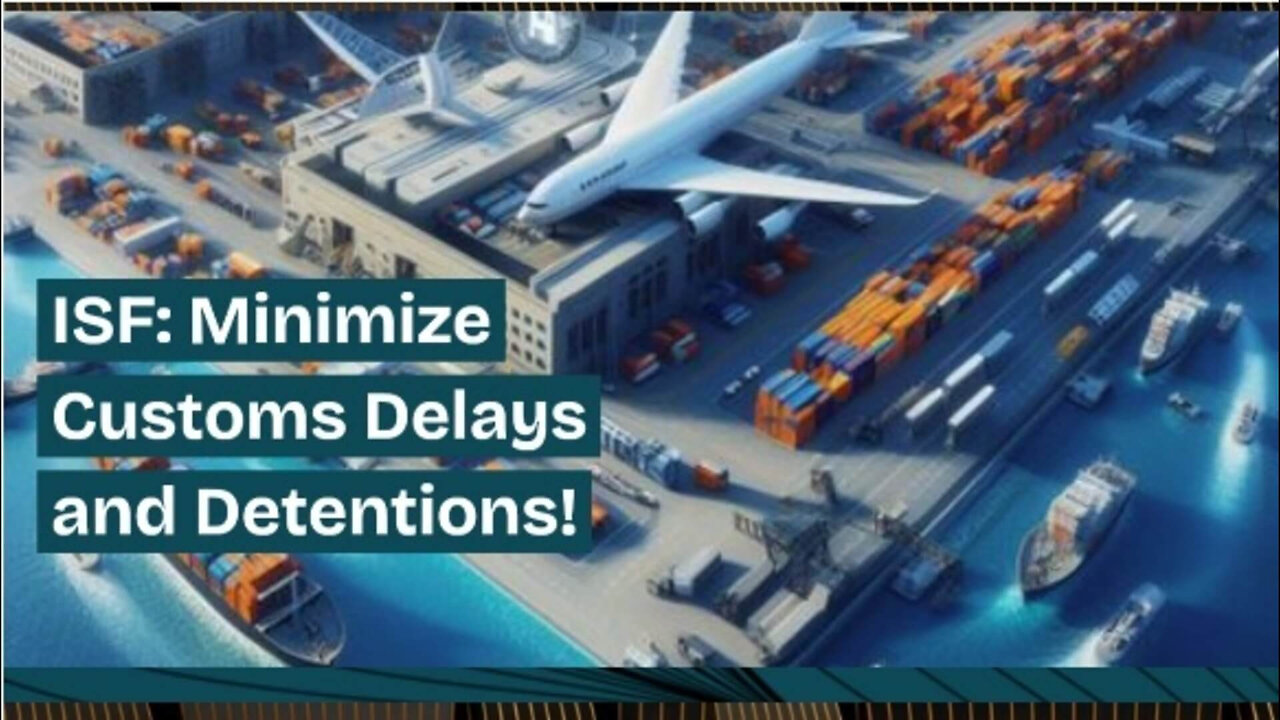Premium Only Content

Demystifying Importer Security Filing: Minimize Customs Delays and Detentions
License To Import // 323-578-6432 // file@licensetoimport.com // www.licensetoimport.com
In today's video, we will be discussing the concept of Importer Security Filing (ISF) and how it can effectively reduce customs delays and detentions. The ISF is a mandatory requirement in the United States for all cargo arriving by vessel, and it must be filed at least 24 hours prior to the loading of the cargo onto the vessel at the port of departure. The purpose of the ISF is to improve the security of the international supply chain by collecting crucial information about the imported goods before they arrive. This information includes details about the shipper, consignee, manufacturer, container stuffing location, and a comprehensive description of the goods being imported. By providing this information beforehand, customs authorities are able to conduct risk assessments and prioritize their inspections, resulting in a more efficient process and a reduced likelihood of delays at the port. Minimizing customs delays is essential for importers as it helps them avoid additional costs and disruptions in their supply chain. When a shipment is held due to incomplete or inaccurate ISF filings, importers may incur demurrage and storage charges. In addition, delays in shipments can have a negative impact on production schedules and lead to stock shortages, ultimately resulting in dissatisfied customers. Another advantage of correctly filing the ISF is the ability to minimize the risk of cargo detentions. Customs may flag shipments for further inspection if there are inconsistencies or suspicious information in the filing. By ensuring that all information is accurate and providing any necessary supporting documentation, importers can decrease the chances of their cargo being held for further examination. It is important to note that the responsibility for filing the ISF lies with the importer or their authorized agent, such as a customs broker. Collaborating with an experienced customs broker who possesses a deep understanding of the ISF process can greatly facilitate the filing procedure and help avoid common errors. To conclude, the Importer Security Filing serves as a vital component of the customs clearance process. It not only enhances the security of the international supply chain but also assists importers in minimizing customs delays and cargo detentions. By offering accurate and comprehensive information in a timely manner, importers can ensure a smoother and more efficient importation process. If you found this video informative, please show your support by giving it a thumbs up and subscribing to our channel for more valuable content on customs brokerage and international trade. Thank you for watching, and we look forward to seeing you in our next video!
#usimportbond #isfcustomsbroker #uscustomsclearing #isfentry
Video Disclaimer Here: This video is solely for education and is not endorsed by any US government agency.
00:36 ISF (Importer Security Filing) is mandatory for all cargo arriving in the U.S. by vessel, filed at least 24 hours before loading, to enhance supply chain security by providing detailed information about imported goods.
01:06 Providing ISF information in advance allows customs authorities to conduct risk assessments, prioritize inspections, and reduce delays at the port, helping importers avoid additional costs and disruptions in their supply chain.
02:56 Working with an experienced customs broker for ISF filing can facilitate the process, minimize the risk of cargo detentions, and ensure a smoother and more efficient importation process, benefiting both importers and the security of the international supply chain.
-
 LIVE
LIVE
Pepkilla
4 hours agoWarzone Ranked Road to 250 ~ HaLLLLPPPPP
586 watching -
 2:14:38
2:14:38
SLS - Street League Skateboarding
9 days ago2024 SLS Super Crown São Paulo: Men's Prelims
128K12 -
 46:39
46:39
Stephen Gardner
5 hours ago🔥FINALLY! Trump BLACKMAIL scheme EXPOSED | 'Ukraine will be DESTROYED' worries US Pentagon!
51.4K108 -
 1:11:18
1:11:18
PMG
6 hours ago"How Rockefeller BURIED Silver’s Miracle Healing Powers for Big Pharma Profits w/ Jeff Adam"
254 -
![Devin Nunes - Truth Social Gets An Upgrade, We Will Celebrate The Destruction Of The [DS] With Wine](https://1a-1791.com/video/s8/1/0/G/j/J/0GjJv.0kob-small-Devin-Nunes-Truth-Social-Ge.jpg) 50:15
50:15
X22 Report
7 hours agoDevin Nunes - Truth Social Gets An Upgrade, We Will Celebrate The Destruction Of The [DS] With Wine
125K71 -
 1:40:54
1:40:54
Michael Franzese
17 hours agoBiden's not done destroying America & what happened in New Jersey?
53.2K67 -
 1:20:47
1:20:47
SLS - Street League Skateboarding
9 days ago2024 SLS Super Crown São Paulo: Women's Prelims
113K5 -
 15:14
15:14
DeVory Darkins
1 day ago $22.93 earnedDemocrats PANIC After Fetterman Meets with Pete Hegseth
81.2K59 -
 1:49:05
1:49:05
Tactical Advisor
7 hours agoQuitting my Job & Giveaway Winner! | Vault Room Live Stream 010
60.1K16 -
 2:11:33
2:11:33
I_Came_With_Fire_Podcast
13 hours agoThe Great Reset, AI Ethics, and Quantum Tech: Exploring Power, Rights, and Media Control
37.7K21